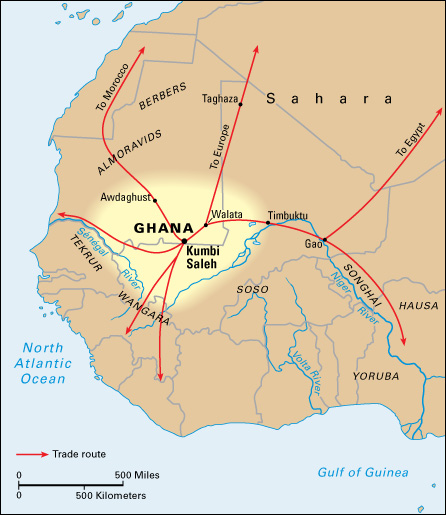Ghana << GAH nuh >> Empire was an important trading state in West Africa from about the A.D. 300’s to the mid-1000’s. The empire lay in what is now southeastern Mauritania and western Mali. The Soninke people of West Africa founded and ruled the empire.

Ghana began as a center for trade in grains, cattle, and metals among African peoples. Starting in the 700’s, camel caravans brought products from the Arabic world across the Sahara to Ghana’s markets. These goods included books, salt, textiles, and tools. They were traded for gold, ivory, and slaves from regions south of Ghana. Kumbi Saleh, Ghana’s last capital, was then one of West Africa’s largest cities. It likely had about 30,000 people.
According to West African oral tradition, Ghana’s people called their land Wagadu. Its founders are said to have been the hero and magician Dinga and his warrior son Dyabe, who led their people through a series of migrations and conquests. Later rulers of Ghana claimed to be descendants of Dinga. Starting about 800, Ghana’s kings began to require the rulers of its many provinces to obey the kings’ laws and make forced payments called tribute. For many years, Ghana’s army kept the trade routes to Ghana secure. However, Moroccan Berbers called Almoravids captured Kumbi Saleh in 1076. The Almoravids left Ghana in the late 1000’s, but by then, the outer parts of the empire had declared their independence. The Soninke never regained their power. Some fled to the former Ghana province of Soso. Under King Sumanguru, Soso conquered the remaining territories of Ghana around 1200.
